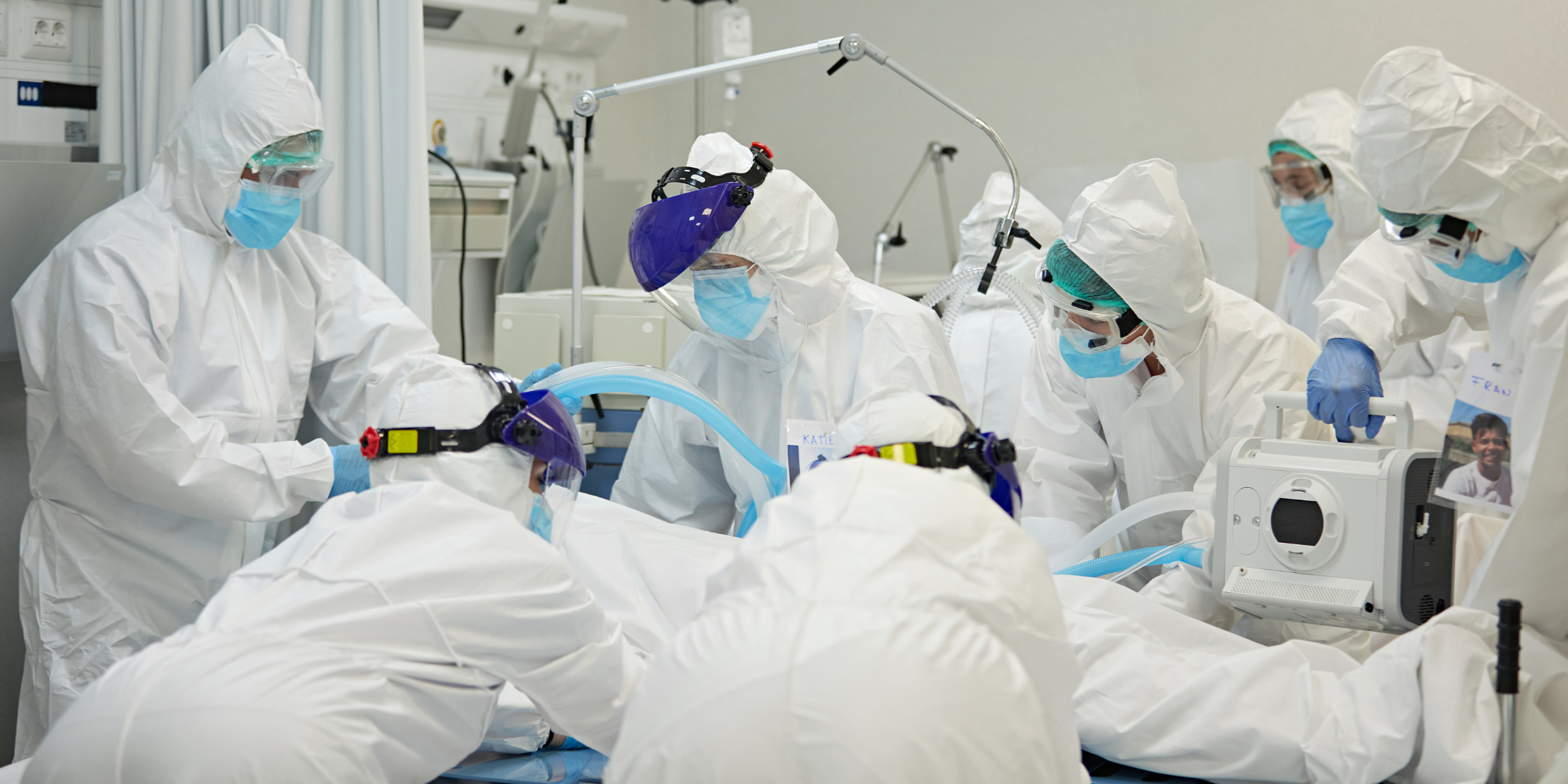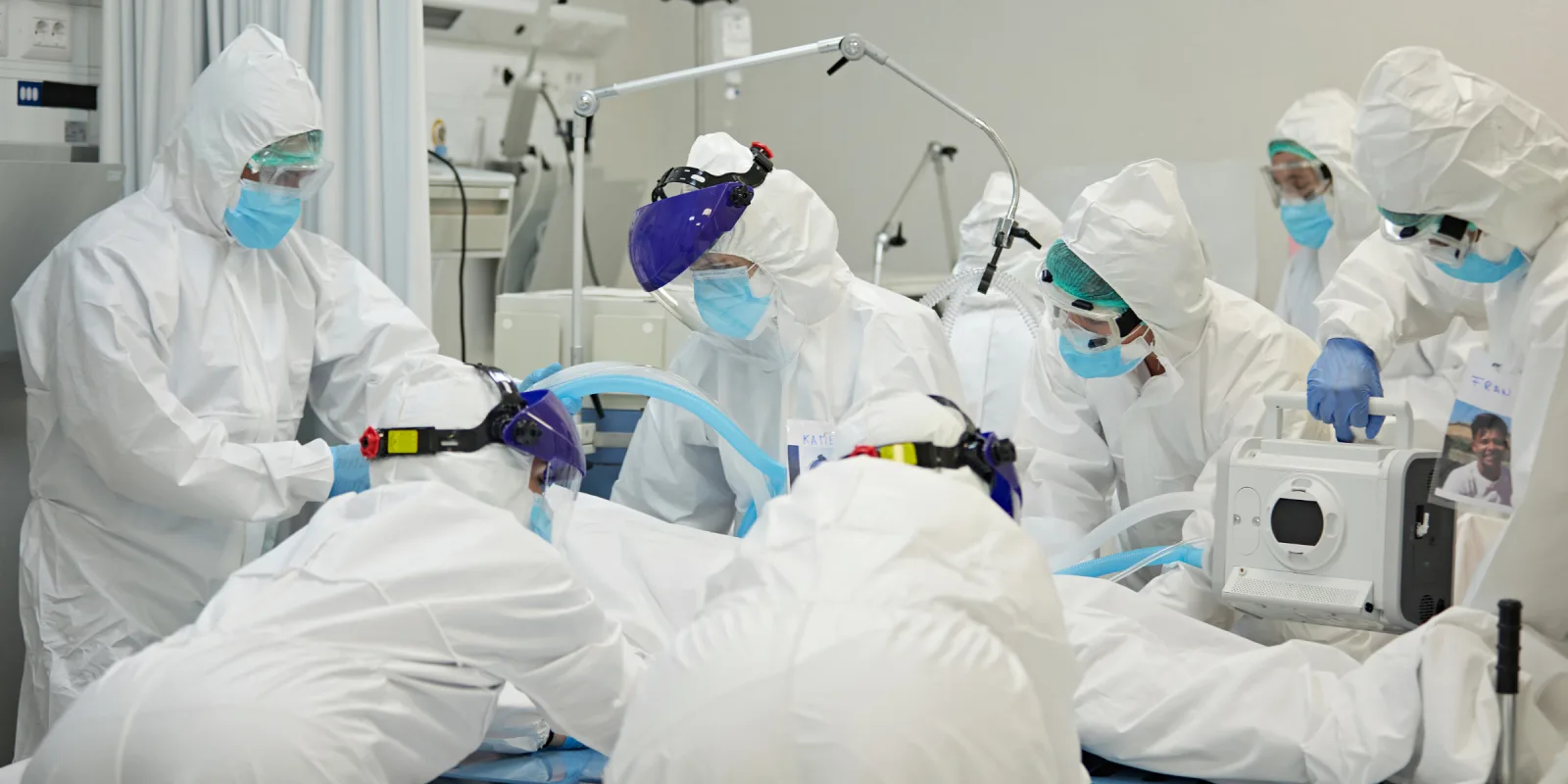
A few months ago, I saw my first COVID-19 patient. I was consulted for an oropharyngeal hemorrhage in a woman on ECMO. Patients on ECMO require anticoagulation, often have multisystem failure and other coagulopathies, and sometimes bleed from mucosal surfaces. This is not an uncommon consult request for the ENT department at our institution. Once the ICU team calls us, we usually pack the intubated and sedated patient’s mouth and throat tightly with gauze to help prevent further bleeding.
This time was different.
I left my intern and our team’s PA outside of the ICU. I removed all of my personal belongings and placed them on a counter outside the patient’s room: my cell phone, hospital identification badge, pen, wallet, patient list, and silicone wedding band. I suited up with my N95 respirator and powered air-purifying respirator, disposable gown, and double layer of gloves with the help of a nursing safety officer and stepped into the room.
The patient was in her early 60s, obese, and had been diagnosed with COVID-19 just 14 days before. Her respiratory symptoms rapidly progressed to acute respiratory distress syndrome and she was transferred to our hospital for ECMO. Now, she was lying in bed, intubated, on ECMO, and bleeding from her mouth and nose.
"Why don’t you ask someone on the ICU team to do it?" is a question I heard more than once from my teammates and attending physician on call. While I appreciated the logic behind that question, I wrestled with this one: How could I ask someone else to do my job? I briefly mulled over how I would approach this: “Excuse me, ICU nurse, I know you have a lot going on, but could you also do this, you know, the procedure the ICU attending asked me to do?” That didn’t sit well with me.
I opened the door and stepped into what felt like a hazmat zone. As I looked around the room, I couldn’t help but notice the two ICU nurses there with me. One was a tall, fit man in his mid-30s. The other was an older woman, probably around my mother’s age and likely at higher risk for severe illness. There she was, adjusting the sweep gas flow rate, drawing labs, hanging antibiotics, going about her business as usual. This woman, these people, were on the front lines.
In the days that followed, I was gently admonished by a few of my attendings. “You have to be careful,” they told me, and “that was unnecessary, don’t be a hero.” These weren’t their exact words, but it was the sentiment. They were probably right. Sadly, the patient died just two short days after I packed her mouth, throat, and nose. The truth is, I didn’t feel heroic. Was I excited to step into the trenches? Of course. This is war, what soldier wouldn’t be?
But this missed the point. I was not the hero, nor was I trying to be. Those ICU nurses, living inside COVID-19 ICU rooms for 12 hours a day — they are the heroes. Think about feeling uneasy walking through the grocery store, worried you may touch the wrong thing and come in contact with the virus. Now imagine laying your gloved hands on patients battling for their lives, covered head to toe with highly infectious viral particles. What’s more, if you slip up, if your N95 isn’t on tightly enough, if you touch your face when taking off your mask, you may contract the disease. And because of your age or your own underlying health conditions, you may not do so well. Why are they doing this? Because it’s their job. More than that, because it’s their duty to their fellow humans.
Since the start of this pandemic, I have been blessed to receive an outpouring of support from my family, friends, old acquaintances, and even random strangers, thanking me for my work “on the front lines” as a physician. Most are confused when I tell them the truth; that I am not on the front lines and my workload has significantly slowed. Who is on the front lines? Intensivists, respiratory therapists, environmental services staff (who deep-clean the hospitals, including COVID-19 patient rooms), speech language pathologists, security guards, anesthesiologists, internists, ER doctors, workers testing patients for COVID-19, and all the NPs, RNs, PAs, residents (including many of my fellow ENT residents who have been “flexed” to COVID-19 ICUs) and fellows working on the hospital wards, ICUs, ERs, and outpatient clinics — they are the true heroes.
I encourage you to reach out to your family, friends, old acquaintances, and colleagues in the medical field. Tell them you are proud of them, you love them, you are grateful for their sacrifice. By all means, praise our front line health care workers as heroes — just make sure your praise is directed at the people worthy of it.
Collin Mulcahy is a chief resident in otolaryngology at the George Washington University Hospital in Washington, DC. After anticipated completion of his training in June 2021, he plans to pursue a fellowship in head and neck surgical oncology.
Click here to see more perspectives on COVID-19 from the Doximity network.
Click here for up-to-date news about COVID-19 on Doximity.





